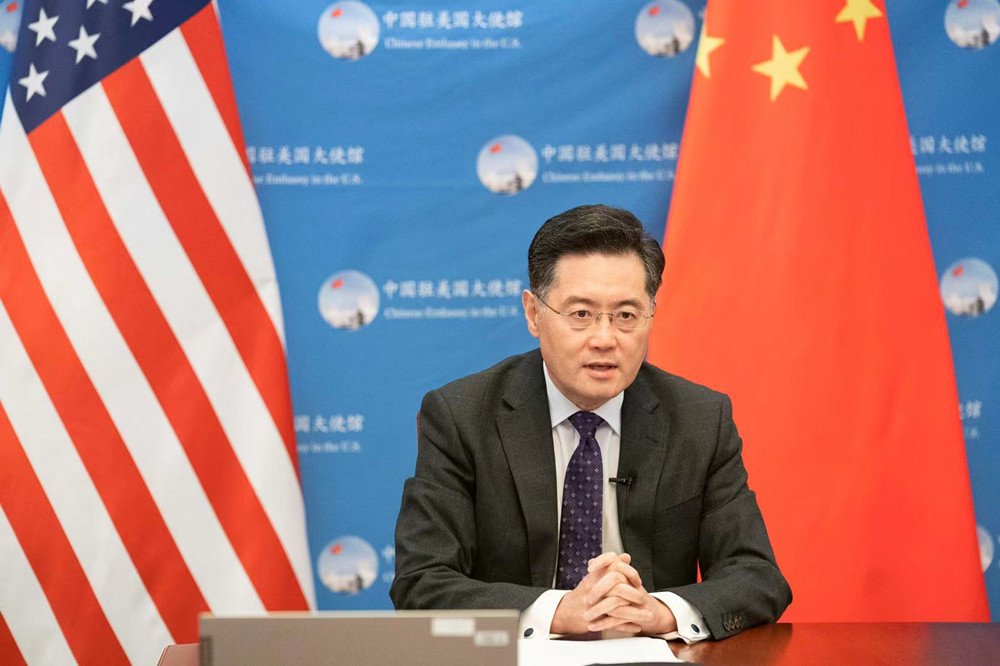Innovation offers path to mutual gains
By Zhao Huanxin in Washington | chinadaily.com.cn | Updated: 2021-09-24 16:20

With right spirit tapped, a 'golden key' can open up US-China progress, envoy says
Beijing's top envoy in Washington has urged the United States to reciprocate with China's continued push for technology and trade cooperation, instead of setting up barriers, as the two countries have enormous potential to tap in the new economy and innovation.
"China will continue to expand opening-up, continue to do business with the world, and promote technology and trade cooperation with the US side," Chinese Ambassador Qin Gang said at a webinar on Thursday. "The US side also needs to create conditions, instead of barriers, for our cooperation."
As major innovators and the top two economies in the world, China and the US can advance coordination and cooperation on climate change, the response to COVID-19 and economic recovery, as outlined in Chinese President Xi Jinping's recent phone call with US President Joe Biden, he said.
Those areas of cooperation are innovation intensive and offer huge potential, Qin said at the High-Level Meeting of Bloomberg New Economy Forum.
"For China-US relations, innovation is a 'golden key' to some thorny issues," he said. "We need an innovative spirit more than ever before to address the complexities and difficulties of this relationship."
That innovative spirit includes a new vision that sees mankind as a community with a shared future, in which no country can solve the world's difficulties and challenges alone, and no country can stand aloof from them, Qin noted.
It also entails a new way of thinking, together with an acknowledgment that China and the US, though differing in history, culture and social systems, have so deeply intertwined interests that no one side can do without the other, nor can one side change or replace the other.
"We will act to open up a path of national renaissance and peaceful development. At the same time, we call upon the US to stay committed to peaceful development, abandon any wrong thinking, and work with China to find a way of getting along based on mutual respect and win-win cooperation," Qin said.
The ambassador said the China-US relationship has gone through tremendous changes, and it cannot return to the past anymore.
"We have to face the reality, look to the future, think out of the box, create new institutions and methods and open up new dimensions for China-US engagement," he said.
On Wednesday at another online meeting, Qin said China has shown "great sincerity" in starting up a dialogue with the US to de-escalate the tensions in the bilateral relationship.
While China will work with the US as long as there are opportunities for cooperation, that cooperation must be conducted on the principle of mutual respect, Qin said in response to a question during the online conversation, which was held by The Carter Center and The George H.W. Bush Foundation for US-China Relations.
"The United States should not expect China's cooperation in areas where only the US has demands and interests, while neglecting or even undermining China's interests at the same time, in particular on these core issues concerning China's sovereignty and territorial integrity," he said.
David J. Firestein, the Bush foundation's president and chief executive, said the US-China relationship today is more strained than it has ever been in the past 50 years, and that situation is bad for both countries and the rest of the world.
From pandemics, global public health and climate change to nuclear nonproliferation and counterterrorism, no major global challenge can be effectively addressed in the absence of US-China collaboration, Firestein said.
"We should recognize that while the US and China are, in fact, competitors, that dimension of our relationship should not crowd out cooperation where cooperation makes sense for both our countries and for the world," he said.
























